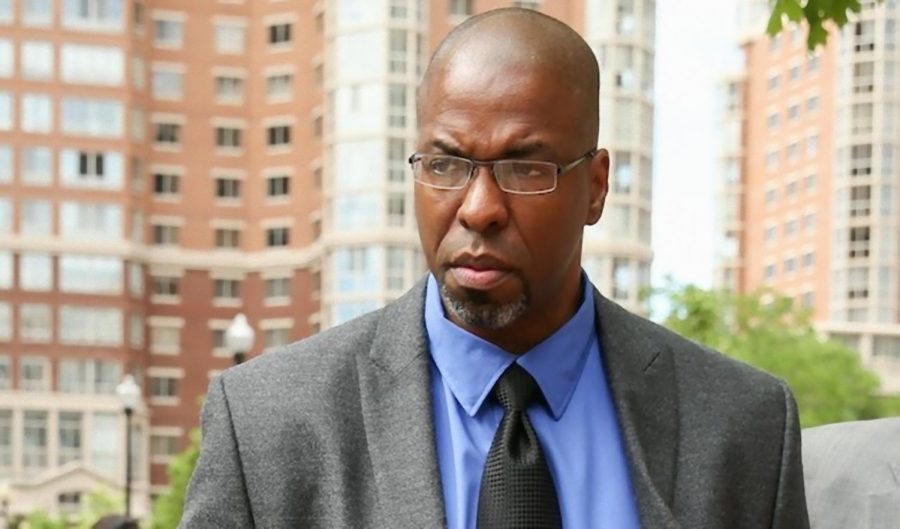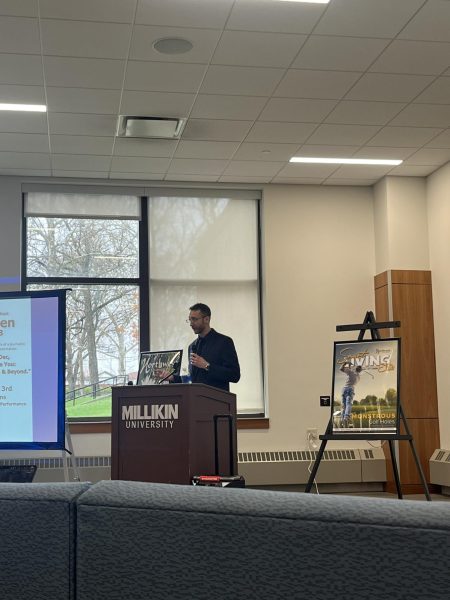To Thine Own Self Be True
Millikin Alum returns to tell a powerful story.
Photo Courtesy of Wikimedia Commons
Jeffrey Sterling
Jeffrey Sterling, a former CIA case officer and Millikin alum, spoke on campus about his book. Sterling’s book Unwanted Spy: The Persecution of an American Whistleblower addresses his conviction of violating the Espionage Act.
The discrimination Sterling faced within the CIA created an uphill battle for the former CIA employee. His struggles provided us with a new perspective on racism within our own government agencies. It also set in motion the eye-opening experience prisoners face when dealing with healthcare.
Sterling’s spoke first about his time at Millikin and how it prepared him for his future. Sterling was a TKE and studied political science at Millikin. He credited the political science department for ensuring his readiness for law school. After graduating from Millikin Sterling attended Washington University School of Law.
After graduating from law school, Sterling responded to a newspaper ad to join the CIA. He got the job. He expressed how he thought this was his dream job.
Jeffrey Sterling had learned Farsi: the official language of Iran. He ended up working on the Iran Task Force as a case officer, becoming the only black officer in the task force.
A case officer’s role is to recruit spies. He convinced people in companies and foreign governments to give him information. After recruiting a spy, Sterling needed to train them.
Sterling noticed the CIA was not giving him the proper tools to ensure a mission’s success. Despite this, Sterling noted that he was still able to operate undetected. He expands to say his credentials were basically laminated pieces of paper.
He went to his supervisors with his concerns. They questioned how he could go undetected as a “big black guy speaking Farsi.” He explained that he was close to quitting but did not give them the pleasure. Sterling expanded on this by saying
“I don’t look like Jack Ryan,” Sterling said, indicating the agency’s defense as invalid.
The CIA assigned Sterling to “Operation Merlin,” a mission tasked with slowing down Iran’s nuclear weapon development. The plan was to give Iran the plans to build nuclear weapons, but the plan would have a flaw. Sterling stated that he was “basically told the president approved this plan.” Sterling saw weaknesses in the operation and brought them to his superiors. They responded by telling him to “shut up”.
The CIA removed Sterling from “Operation Merlin” after he filed a complaint about racial discrimination. A lawsuit was filed but the judge dismissed the case after the government argued treating him as an equal would be a threat to national security. Sterling was then fired from the CIA.
He had trouble finding employment following his removal from the CIA. Despite no longer being part of the CIA, Sterling testified before the House Intelligence Committee. He brought his concerns for Operation Merlin and his suit to their attention.
James Risen, a journalist for the New York Times released a book, “State of War: The Secret History of the CIA and Bush Administration” in 2006. The book depicted government secrets from “Operation Merlin.” The government assumed Sterling had leaked information illegally.
The assumption rose from Risen’s previous contact with Sterling about an article covering his suit against the CIA. Risen’s article about Jeffrey Sterling’s previous suit revealed nothing classified. But, Sterling had issues with the agency, motivating them to believe he was the whistleblower.
That same year, the government issued a search warrant on Sterling’s home. Years later in 2011, Sterling was indicted. The FBI arrested Sterling in St. Louis but then transferred him to Virginia. His trial began in 2015, four years following his arrest.
Holly, Jeffrey Sterling’s wife, reached out to civil rights organizations for help during the trial, but few replied.
Sterling, on trial for violating the Espionage Act, mentioned the prosecution won the right to call James Risen as a witness. They failed to follow through. He went on to discuss how this was “no more than a show trial.”
“The government proved beyond a reasonable doubt that I was black,” Sterling said, indicating that he was being accused based on his history with the agency’s racial discrimination. Sterling claimed that the government was trying to make an example out of him.
Sterling was sentenced to 42 months in prison even though he faced 90 years. The prosecution was visibly upset by the outcome, claimed Sterling.
While in prison Sterling made sure to stay true to himself. He said that he spoke with Holly everyday and she sent books to him during his sentence. Sterling mentioned his fascination with Shakespeare and highlighted a quote he tries to live by: “to thine own self be true.” That quote was symbolic for Sterling who worked hard to not let prison change him.
As mentioned, Holly sent books to Sterling while in prison. Some books sent were written in Farsi so that Sterling could keep with the language he learned. At first the books were withheld because nobody in the prison administration could read the text. They had made the xenophobic assumption that Sterling may have had links to terrorist organizations. Eventually the books were given to Sterling, but it should not have been withheld in the first place.
The right to read in Farsi was not the only thing Sterling had to fight for. While in prison Sterling was denied proper healthcare.
Sterling notes that he was not trying to cause any problems in prison, but he would not back down either. This was how Sterling stayed true to himself.
During line up a guard claimed Sterling was not standing correctly. Sterling responded by asking for the guard’s name so he could report him to his supervisors. The guard had then attempted to fight Sterling asking him “want to go?”. Sterling was placed in solitary confinement by the guard. The guard did not share the same perspective of the situation and instead claimed Sterling threatened him.
While in confinement Sterling was “denied medication for his heart condition and endured a cardiac-related episode”. Sterling shared that the prison knew about his heart condition and that he was told to “drink some water” despite his pulse being over 100 beats per minute.
It was up to Holly to ensure her husband got proper healthcare. It wasn’t until she got Senator Michael Bennet to intervene that Sterling was given proper healthcare.
Holly endured a lot during her husbands’ trial and time in prison. He credited her with many accomplishments providing him with the means to survive. Holly organized 20,000 emails and calls to be directed to the prison warden to encourage the warden to intervene in Sterling’s lack of healthcare. Holly even wrote a fourteen-page letter that was delivered to President Obama asking for his aid. Both Holly and Jeffrey stated that without the intervention of Senator Michael Bennet, Jeffrey may have died.
Sterling was released from prison in 2018 and off probation in July of 2019.
Sterling had mixed feelings about the possibility of ever receiving a presidential pardon. He stated, “I can’t see this current administration doing that for whatever reason.”
In order to receive a pardon, the pardoned would have to admit guilt. In response, Sterling mentioned that “the point is to be fair” but he would never accept anything while admitting to something he did not do.
Sterling’s frustrations with the situation stemmed from the system treating him differently.
“It was like I was kicked out of my country,” Sterling said after receiving his sentencing.
Sterling’s story provides us with a base to challenge our government and demand equality with agencies and within the prison system.











